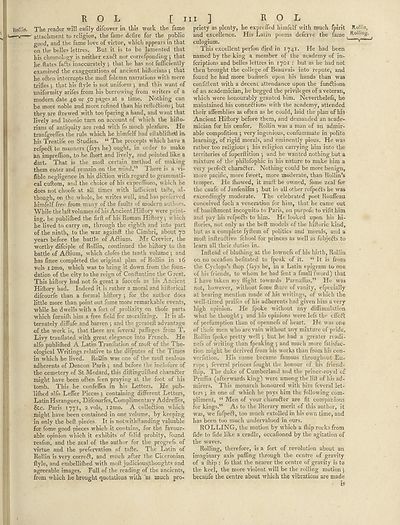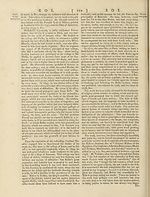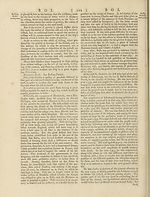Encyclopaedia Britannica, or, a Dictionary of arts, sciences, and miscellaneous literature : enlarged and improved. Illustrated with nearly six hundred engravings > Volume 18, RHI-SCR
(119) Page 111
Download files
Complete book:
Individual page:
Thumbnail gallery: Grid view | List view

R O L [i
Tiollin. The reader will eafily difcover in this work the fame
attachment to religion, the fame defire for the public
good, and the fame love of virtue, which appears in that
on the belles lettres. But it is to be lamented that
his chronology is neither exaft nor correfponding j that
he ftates fa<5ls inaccurately *, that he has not fufficiently
examined the exaggerations of ancient hiftorians ; that
he often interrupts the moft folemn narrations with mere
trifles } that his ftyle is not uniform ; and this want of
uniformity arifes from his borrowing from writers of a
modern date 40 or 50 pages at a time. Nothing can
be more noble and more refined than his refle&ionsj but
they are ftrewed with too fparing a hand, and want that
lively and laconic turn on account of which the hifto¬
rians of antiquity are read with fo mucli pleafure. He
tranfgrefles the rule which he himfelf had eftablifhed in
his Treatife on Studies. “ The precepts which have a
refpeft to manners (fays he) ought, in order to make
an impreflion, to be fhort and lively, and pointed like a
dart. That is the moft certain method of making
them enter and remain on the mind.” There is a vi¬
able negligence in his diction with regard to grammati¬
cal cuftom, and the choice of his expreftions, which he
does not choofe at all times with fufficient tafte, al¬
though, on the whole, he writes well, and has preferved
himfelf free from many of the faults of modern authors.
While thelaft volumes of his Ancient Hiftory were print¬
ing, he publifhed the firft of his Roman Hiftory j which
he lived to carry on, through the eighth and into part
of the ninth, to the war againft the Cimbri, about 70
years before the battle of Aftium. Mr Crevier, the
worthy difciple of Rollin, continued the hiftory to the
battle of Aftium, which clofes the tenth volume ; and
has finee completed the original plan of Rollin in 16
vols 12mo, which was to bring it down from the foun¬
dation of the city to the reign of Conftantine the Great.
This hiftory had not ft) great a fuccefs as his Ancient
Hiftory had. Indeed it is rather a moral and hiftorical
difcourfe than a formal hiftory j for the author does
little more than point out fome more remarkable events,
while he dwells with a fort of prolixity on thofe parts
which furnilh him a free field for moralizing. It is al¬
ternately diffufe and barren •, and the greateft advantage
of the work is, that there are feveral paffages from T.
Livy tranflated with great elegance into French. He
alfo publiftied A Latin Tranflation of moft of the The¬
ological Writings relative to the difputes of the Times
in which he lived. Rollin was one of the moft zealous
adherents of Deacon Paris ; and before the inclofure of
the cemetery of St Medard, this diftinguiftied character
might have been often feen praying at the foot of his
tomb. This he confeffes in his Letters. He pub¬
liftied alfo Lefler Pieces 5 containing different Letters,
Latin Harangues, Difcourfes, Complimentary Addrelfes,
&c. Paris 1771, 2 vols, i2mo. A collection which
might have been contained in one volume, by keeping
in only the belt pieces It is notwithstanding valuable
for fome good pieces which it contains, for the favour¬
able opinion which it exhibits of folid probity, found
reafon, and the zeal of the author for the progrefs of
virtue and the prefervation of tafte. The Latin of
Rollin is very correCt, and much after the Ciceronian
ftyle, and embellifhed with moft judiciousithoughts and
agreeable images. Full of the reading of the ancients,
from which he brought quotations with "as much pro-
1 ] R O L
priety as plenty, he exprefled himfelf with much fpirit Roilin,
and excellence. His Latin poems deferve the fame Ko11*^
eulogium. v
This excellent perfon died in 1741. He had been
named by the king a member of the academy of in-
fcriptions and belles lettres in 1701 : but as he had not
then brought the college of Beauvais into repute, and
found he had more buiinefs upon his hands than was
confident with a decent attendance upon the functions
of an academician, he begged the privileges of a veteran,
•which were honourably granted him. Neverthelefs, he
maintained his connexions with the academy, attended
their aflemblies as often as he could, laid the plan of his
Ancient Hiftory before them, and demanded an acade¬
mician for his cenfor. Rollin was a man of an admir¬
able compofition j very ingenious, confummate in polite
learning, of rigid morals, and eminently pious. He was
rather too religious ; his religion carrying him into the
territories of fuperftition •, and he wanted nothing but a
mixture of the philofophic in his nature to make him a
very perfeX charaXer. Nothing could be more benign,
more pacific, more fweet, more moderate, than Rollin’s
temper. He {bowed, it mult be owned, fome zeal for
the caufe of Janfenifm ; but in all other refpeXs he was
exceedingly moderate. The celebrated poet Roufieau
conceived fuch a veneration for him, that he came out
of banifhment incognita to Paris, on purpofe to vifit him
and pay his refpeXs to him. He looked upon his hi-
ftories, not only as the beft models of the hiftoric kind,
but as a complete fyftem of politics and morals, and a
moft inftruXive fchool for princes as well as fubjeXs to
learn all their duties in,.
Inftead of bluftiing at the lownefs of his birth, Rollin
on no occafion hefitated to fpeak of it. “It is from
the Cyclops’s fhop (fays he, in a Latin epigram to- one
of his friends, to whom he had fent a fmall fword) that
I have taken my flight towards Parnaflus.” He was
not, however, without fome (hare of vanity, efpecially
at hearing mention made of his writings, of which the
well-timed prailes of his adherents had given him a very
high opinion. He fpoke without any diftimulation
what he thought; and his opinions were lefs the effeX
of prefumption than of opennefs of heart. He w as one
of thofe men who are vain without any mixture of pride.
Rollin fpoke pretty well $ but he had a greater readi-
nefs of writing than fpeaking j and much more fatisfac-
tion might be derived from his works than from his con-
verfation. His name became famous throughout Eu¬
rope ; feveral princes fought the honour of his friend-
fhip. The duke of Cumberland and the prince-royal of
Pruflia (afterwards king) were among the lift of his ad¬
mirers. This monarch honoured with him feveral let¬
ters j in one of which he pays him the following com¬
pliment, “ Men of your charaXer are fit companions
for kings.” As to the literary merit of this author, it
was, we fufpeX, too much extolled in his own time, and
has been too much undervalued in ours.
ROLLING, the motion by which a ftiip rocks from
fide to fide like a cradle, occafioned by the agitation of
the waves.
Rolling, therefore, is a fort of revolution about an
imaginary axis pafling through the centre of gravity
of a {hip : fo that the nearer the centre of gravity is to
the keel, the more violent will be the rolling motion ;
becaufe the centre about which the vibrations are made
i?
Tiollin. The reader will eafily difcover in this work the fame
attachment to religion, the fame defire for the public
good, and the fame love of virtue, which appears in that
on the belles lettres. But it is to be lamented that
his chronology is neither exaft nor correfponding j that
he ftates fa<5ls inaccurately *, that he has not fufficiently
examined the exaggerations of ancient hiftorians ; that
he often interrupts the moft folemn narrations with mere
trifles } that his ftyle is not uniform ; and this want of
uniformity arifes from his borrowing from writers of a
modern date 40 or 50 pages at a time. Nothing can
be more noble and more refined than his refle&ionsj but
they are ftrewed with too fparing a hand, and want that
lively and laconic turn on account of which the hifto¬
rians of antiquity are read with fo mucli pleafure. He
tranfgrefles the rule which he himfelf had eftablifhed in
his Treatife on Studies. “ The precepts which have a
refpeft to manners (fays he) ought, in order to make
an impreflion, to be fhort and lively, and pointed like a
dart. That is the moft certain method of making
them enter and remain on the mind.” There is a vi¬
able negligence in his diction with regard to grammati¬
cal cuftom, and the choice of his expreftions, which he
does not choofe at all times with fufficient tafte, al¬
though, on the whole, he writes well, and has preferved
himfelf free from many of the faults of modern authors.
While thelaft volumes of his Ancient Hiftory were print¬
ing, he publifhed the firft of his Roman Hiftory j which
he lived to carry on, through the eighth and into part
of the ninth, to the war againft the Cimbri, about 70
years before the battle of Aftium. Mr Crevier, the
worthy difciple of Rollin, continued the hiftory to the
battle of Aftium, which clofes the tenth volume ; and
has finee completed the original plan of Rollin in 16
vols 12mo, which was to bring it down from the foun¬
dation of the city to the reign of Conftantine the Great.
This hiftory had not ft) great a fuccefs as his Ancient
Hiftory had. Indeed it is rather a moral and hiftorical
difcourfe than a formal hiftory j for the author does
little more than point out fome more remarkable events,
while he dwells with a fort of prolixity on thofe parts
which furnilh him a free field for moralizing. It is al¬
ternately diffufe and barren •, and the greateft advantage
of the work is, that there are feveral paffages from T.
Livy tranflated with great elegance into French. He
alfo publiftied A Latin Tranflation of moft of the The¬
ological Writings relative to the difputes of the Times
in which he lived. Rollin was one of the moft zealous
adherents of Deacon Paris ; and before the inclofure of
the cemetery of St Medard, this diftinguiftied character
might have been often feen praying at the foot of his
tomb. This he confeffes in his Letters. He pub¬
liftied alfo Lefler Pieces 5 containing different Letters,
Latin Harangues, Difcourfes, Complimentary Addrelfes,
&c. Paris 1771, 2 vols, i2mo. A collection which
might have been contained in one volume, by keeping
in only the belt pieces It is notwithstanding valuable
for fome good pieces which it contains, for the favour¬
able opinion which it exhibits of folid probity, found
reafon, and the zeal of the author for the progrefs of
virtue and the prefervation of tafte. The Latin of
Rollin is very correCt, and much after the Ciceronian
ftyle, and embellifhed with moft judiciousithoughts and
agreeable images. Full of the reading of the ancients,
from which he brought quotations with "as much pro-
1 ] R O L
priety as plenty, he exprefled himfelf with much fpirit Roilin,
and excellence. His Latin poems deferve the fame Ko11*^
eulogium. v
This excellent perfon died in 1741. He had been
named by the king a member of the academy of in-
fcriptions and belles lettres in 1701 : but as he had not
then brought the college of Beauvais into repute, and
found he had more buiinefs upon his hands than was
confident with a decent attendance upon the functions
of an academician, he begged the privileges of a veteran,
•which were honourably granted him. Neverthelefs, he
maintained his connexions with the academy, attended
their aflemblies as often as he could, laid the plan of his
Ancient Hiftory before them, and demanded an acade¬
mician for his cenfor. Rollin was a man of an admir¬
able compofition j very ingenious, confummate in polite
learning, of rigid morals, and eminently pious. He was
rather too religious ; his religion carrying him into the
territories of fuperftition •, and he wanted nothing but a
mixture of the philofophic in his nature to make him a
very perfeX charaXer. Nothing could be more benign,
more pacific, more fweet, more moderate, than Rollin’s
temper. He {bowed, it mult be owned, fome zeal for
the caufe of Janfenifm ; but in all other refpeXs he was
exceedingly moderate. The celebrated poet Roufieau
conceived fuch a veneration for him, that he came out
of banifhment incognita to Paris, on purpofe to vifit him
and pay his refpeXs to him. He looked upon his hi-
ftories, not only as the beft models of the hiftoric kind,
but as a complete fyftem of politics and morals, and a
moft inftruXive fchool for princes as well as fubjeXs to
learn all their duties in,.
Inftead of bluftiing at the lownefs of his birth, Rollin
on no occafion hefitated to fpeak of it. “It is from
the Cyclops’s fhop (fays he, in a Latin epigram to- one
of his friends, to whom he had fent a fmall fword) that
I have taken my flight towards Parnaflus.” He was
not, however, without fome (hare of vanity, efpecially
at hearing mention made of his writings, of which the
well-timed prailes of his adherents had given him a very
high opinion. He fpoke without any diftimulation
what he thought; and his opinions were lefs the effeX
of prefumption than of opennefs of heart. He w as one
of thofe men who are vain without any mixture of pride.
Rollin fpoke pretty well $ but he had a greater readi-
nefs of writing than fpeaking j and much more fatisfac-
tion might be derived from his works than from his con-
verfation. His name became famous throughout Eu¬
rope ; feveral princes fought the honour of his friend-
fhip. The duke of Cumberland and the prince-royal of
Pruflia (afterwards king) were among the lift of his ad¬
mirers. This monarch honoured with him feveral let¬
ters j in one of which he pays him the following com¬
pliment, “ Men of your charaXer are fit companions
for kings.” As to the literary merit of this author, it
was, we fufpeX, too much extolled in his own time, and
has been too much undervalued in ours.
ROLLING, the motion by which a ftiip rocks from
fide to fide like a cradle, occafioned by the agitation of
the waves.
Rolling, therefore, is a fort of revolution about an
imaginary axis pafling through the centre of gravity
of a {hip : fo that the nearer the centre of gravity is to
the keel, the more violent will be the rolling motion ;
becaufe the centre about which the vibrations are made
i?
Set display mode to:
![]() Universal Viewer |
Universal Viewer | ![]() Mirador |
Large image | Transcription
Mirador |
Large image | Transcription
Images and transcriptions on this page, including medium image downloads, may be used under the Creative Commons Attribution 4.0 International Licence unless otherwise stated. ![]()
| Permanent URL | https://digital.nls.uk/193020254 |
|---|
| Attribution and copyright: |
|
|---|
| Description | Ten editions of 'Encyclopaedia Britannica', issued from 1768-1903, in 231 volumes. Originally issued in 100 weekly parts (3 volumes) between 1768 and 1771 by publishers: Colin Macfarquhar and Andrew Bell (Edinburgh); editor: William Smellie: engraver: Andrew Bell. Expanded editions in the 19th century featured more volumes and contributions from leading experts in their fields. Managed and published in Edinburgh up to the 9th edition (25 volumes, from 1875-1889); the 10th edition (1902-1903) re-issued the 9th edition, with 11 supplementary volumes. |
|---|---|
| Additional NLS resources: |
|

